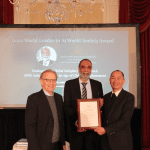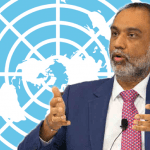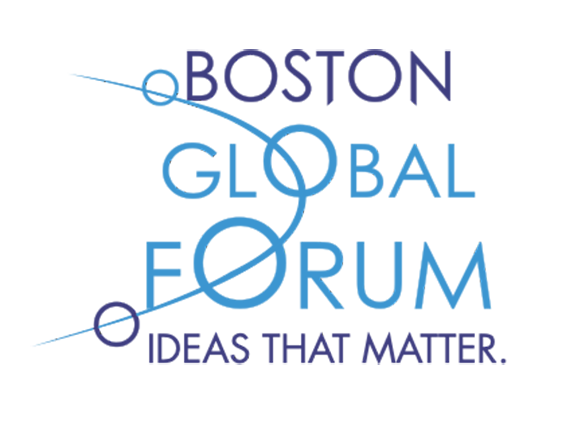February 12, 2023
Digital Tax and Trade Consortium
May 1, 2021
Background
The global pandemic has revealed fractures and fissions within government technology systems. As a result, many nations across the globe are pledging to embark on far-reaching digital transformation initiatives as they emerge from the pandemic. For example, in the EU, China and just 7 additional countries, that digital funding pledge is $1.5T (World Bank data). We’re anticipating that adding the US to the mix should elevate the government digital investment well over $2T; and adding the rest-of-globe may result in $3T+ of total global digital transformation spend. We believe these heightened digital funding commitments serve as a proxy for an emerging wave of global government digitalization.
In June, 2018, AI World Society introduced the concept of AI-Government.
Largely through New America Digital Impact and Governance Initiative (DIGI) led efforts, multiple stakeholders are convening to advance the development and adoption of Digital Public Goods (DPGs). These actors include multilaterals like The World Bank and UN, civil society, large philanthropies – such as Gates and Rockefeller, finance/trade ministers from foreign nations, US Office of Management and Budget (OMB) representatives, etc. New America leads this effort to promote the development of DPGs as a new layer of global digital infrastructure. Through the New America led initiative, we have presented an opportunity to create a new 3-sided market (supply, demand, and financing) for global DPG development and advancement.
This New America / DIGI led multi-stakeholder DPG group has expressed an interest in tax, fiscal and trade DPG development and application within governments. We observe both interest and action from governments poised to engage in broad digital transformation efforts across their tax, fiscal and trade arenas. Some believe that we’ll reach a tipping point in 2021 where most national (and some sub-national) government tax, fiscal, and trade authorities will engage in what we would classify as material digital transformation.
New initiatives in the tax, fiscal and trade space are emerging within the US federal government. EY is connected to the ‘Financial Innovation and Transformation (FIT)’ unit in the Fiscal Services Bureau of US Treasury, engaged in key innovative technology pilots relevant across the US government. US Customs & Border Protection (CBP) has expressed strong interest in developing a blockchain platform for US trade and is interested in a multi-jurisdiction pilot. The US is considering establishing a new Federally Funded Research and Development Center (FFRDC) to advance government digitalization. And, the IRS announced in April 2021 a massive 6-year technology transformation effort.
Across EMEIA, the EU is leading with announced tax, fiscal and trade initiatives. 37 digital tax, fiscal and trade initiatives, many rising to the level of a transformation, were approved by the European Commission in October of 2020, and additional projects will be approved in October 2021. Many of these initiatives have advanced to defined projects (e.g., Estonia, Italy, Hungary, Ireland). Further, we’re anticipating similar traction in Africa; current transformation initiatives on the continent in Kenya, Nigeria, South Africa, and Ghana.
The Asia Development Bank (ADB) leads digital tax transformation efforts across the Region. The ADB is formally launching its Tax Hub, in early May 2021, as the central point for tax policy and transformation in the APAC region. Through the Tax Hub, our Collaborative recently led a workshop with 40+ government tax authorities focused on digital transformation within government tax authorities. We observed keen interest from the participants in the topic. Indonesia was first out of the gate with a World Bank supported digital transformation project.
The Idea
The plethora of government tax, fiscal, and trade digital transformation initiatives are each occurring within a single country domain. A preliminary analysis of this growing digital transformation demand reveals multi-country interest in key tax, fiscal, and trade technology initiatives, including digital identification, multi-party data sharing, e-invoicing, distributed systems (e.g., blockchain) applied to global trade, and artificial intelligence / data systems to improve governmental decision-making. Absent intervention, these initiatives will continue as single-country initiatives, duplicative technology solutions will be developed, and intergovernmental technology interoperability will be sub-optimized.
Our idea is for The Prosperity Collaborative to lead an effort to convert certain aspects of this global digital demand to DPGs immediately available to multiple jurisdictions, playing a key leadership role in advancing DPGs for tax, fiscal, and trade systems within governments, as a practical solution for the Concept of AI-Government, conceived by Boston Global Forum and Michael Dukakis Institute. Our Collaborative builds and leads a multi-stakeholder consortium focused on developing and advancing DPGs in this important space. We could call this new organization the Digital Tax and Trade Consortium (DTTC). This new multi-stakeholder DTTC would be comprised of multilaterals, anchored by The World Bank, and ideally including the UN, OECD, ADB, etc.; fintech providers, World Economic Forum, technologists (principally, Microsoft), philanthropists, and leading policymakers.
Desired Outcomes
- Build the DTTC as a multi-stakeholder consortium, initially led by the Prosperity Collaborative, and preliminarily comprised of the organizations outlined above.
- Focus on the 3-sided market idea promoted by New America, with an emphasis on digital tax, fiscal and trade transformation. Develop a technology platform to manage this 3-sided market (perhaps, with Microsoft).
- Aggregate the growing global demand for digital transformation in this arena, emanating from many nations.
- Identify 1-3 new DPGs, available to serve multi-countries, aligned to the aggregated demand. Assist in the launch of these DPG development projects.
Governance and Operating Model
We propose to house the DTTC within the Connection Science Lab at MIT. The Prosperity Collaborative members will actively build the DTTC, including the identification and secure of DTTC member-stakeholders. Further, the Collaborative members will design a ‘minimum viable governance’ model for the DTTC, which will include an initial organizational Charter (vision, mission, preliminary strategy, operating model, etc.) to guide DTTC governance.
Next Steps
- Discuss this DTTC idea at the next Prosperity Collaborative working group session (May 4, 2021).
- Refine the key elements of this DTTC idea, incorporating feedback from the May 4 Prosperity Collaborative session.
- Organize a working group of Prosperity Collaborative members to develop an initial slate of DTTC member-stakeholders, along with a preliminary DTTC organizational Charter.
- Obtain any necessary approvals for the DTTC from Prosperity Collaborative member organizations.
- Plan and issue the necessary communications to invite others to join the DTTC member-stakeholder group.
- Plan and hold the initial DTTC session (virtually) in July/August 2021.






